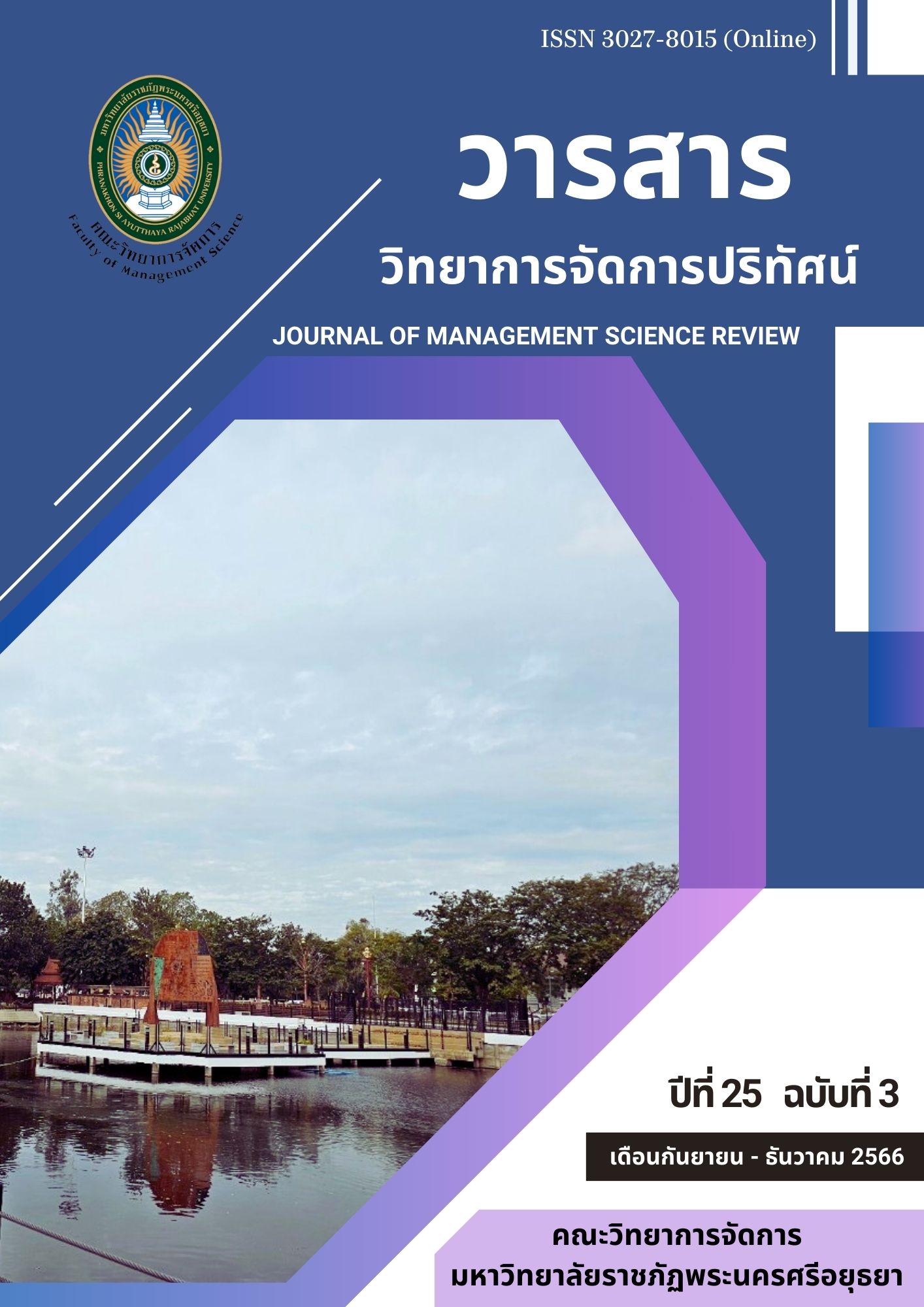Guidelines for Dealing with Changing Consumer Behavior after COVID-19 Crisis of Hotel Business Entrepreneurs in Bangkok and Vicinity
Keywords:
Consumer behavior, Risk perception, Acceptance of innovations, Hotel business entrepreneursAbstract
This research aims to study influences of attitude factors, risk perception, perceived usefulness and acceptance of innovations that affect changing consumer behavior in the post-COVID-19 crisis, and explore guidelines to cope with the said behavior established by hotel business entrepreneurs in Bangkok and vicinity. Highlighting the blended methodology, this research employed an online questionnaire as a tool to collect data from 400 consumers using services provided by the hotels in Bangkok and vicinity. Structural equation modeling (SEM) was performed as the main statistic for data analysis. In terms of the qualitative research on the informants, an in-depth interview form was used for 17 executives of the hotels in Bangkok and vicinity.
The results indicated that that factors in perceived usefulness, risk perception, acceptance of innovations and attitude it has a direct influence on changing consumer behavior in the post-COVID-19 crisis were equal to 0.64, 0.13, 0.12 and 0.11 respectively. The results of checking the causal model consistency of those influences yielded the values of =36.760, df=38, /df=0.937, p-value=0.527, RMSEA=0.000, RMR=0.005, GFI=0.99, AGFI=0.96, NFI= 0.99, IFI=1.00, respectively. They corresponded to the empirical data. In terms of the guidelines to cope with the changing consumer behavior in the post-COVID-19crisis, hotel business entrepreneurs should use modern technology in hotel management, namely automatic systems via online channels, guestroom reservation, asking questions or reporting problems via online chatbot, providing information and advice online, check-in and check-out through the application system. All of them aim to accommodate various needs of consumers.
References
Assael, H. (2004). Consumer Behavior: A Strategic Approach. Boston: Houghton Mifflin.
Demirdogen, O., Yaprakli, S., Yilmaz, M. K., & Husain, J. (2010). Customer Risk Perceptions of Internet Banking – A Study In Turkey. Journal of Applied Business Research (JABR), 26(6), 57-68.
Hoyer, W. D., & Macinnis, D. J. (2007). Consumer Behavior. Boston: Houghton Mifflin.
Jiravibhusetha, R. (2021). Factors affecting consumer's buying behavior of ready-to-eat food products in the digital era. Journal of MCU Loei Review, 2(2), 102-114.
Joreskog, K. G., & Sorbom, D. (1993). LISREL 8: Structural equation modeling with the SIMPLIS command language. Chicago: Scientific Software International.
Kalimullah, K., & Sushmitha, D. (2017). Influence of Design Elements in Mobile Applications on User Experience of Elderly People. Procedia Computer Science, 113(1), 352-359.
Sharma, K., Kumar, Y., & Khosla, R. (2022). Perceived Risk a Factor Influencing Online Shipping Consumer's Psychological Behavior: A Study of Karnal. Journal for ReAttach Therapy and Developmental Diversities, 6(1s), 87-92.
Kotler, P. (2009). Marketing management: analysis, planning implementation and control. New Jersey: Pearson Education.
Lindeman, R. H., Merenda, P. F., & Gold, R. Z. (1980). Introduction to bivariate and multivariate analysis. Glenview, Illinois: Scott, Foresman and Company.
Pongpukdee, N., & Pongpukdee, S. (2021). Know How to Survive Hotel Business Solution. Journal of Roi Kaensarn Academi, 6(6), 358-369.
Potimas, P., & Ngarmsak, T. (2023). A Study of the Attitude toward Behavior, Subject Norm and Perceived Behavior Control that Affect the Purchase Intention of Dietary Supplements of the Consumers in Khon Kaen Municipality. Journal of Modern Learning Development, 8(5), 49-63.
Rogers, E. M., & Shoemaker, F. F. (1962). Communication of innovation: A cross–cultural approach. 2 nd ed.. New York: The Free Press.
Seedokbuab, P., & Wongrat, K. (2022). The Influence of Employee Experience Value Acquisition and Innovation Acceptance on Brand Value Acceptance and Loyalty among Generation Y Customers of a Commercial Bank in Phetchaburi Province. Academic Journal of Phetchaburi Rajabhat University, 12(3), 136-148
Srihirun, J. et al. (2022). Digital Marketing Innovation of Hotel Business. Journal of Marketing and Management, 9(2), 1-16.
Steadmon, C. E., & Kasavana, M. L. (1988). Managing Front Office Operations. 2 nd ed.. Michigan: Richard D. Irwin.
Terblanche, N.S., & Taljaard, A. (2018). The perceived value and perceived benefits experienced by customers using travel agents. South African Journal of Business Management, 49(1), a7.
UNWTO World Tourism Barometer. (2020). WORST YEAR IN TOURISM HISTORY WITH 1 BILLION FEWER INTERNATIONAL ARRIVALS. Retrieved February 1, 2023, From https://www.unwto.org/news/2020-worst-year-in-tourism-history.
WHO Thailand. (2021). Coronavirus disease (COVID-19) questions and answers (general). Retrieved February 1, 2023, From www.who.int/thailand/emergencies/q-a-on-covid-19-general.
Wongprateep, N., & Boonyanmethaporn, W. (2023). Resilience Strategies Service Quality for Business Survival in COVID-19 Pandemic Small Hotels Boutique Lanna Chiang Mai Province. Rajapark Journal, 17(51), 48-65.
Wongrattana, C. (2010). Technique Using Statistics for Research. Bangkok: Tepneramit Printing.
World Health Organization. (2020). Coronavirus disease (COVID-19) pandemic. Retrieved February 1, 2023, From https://www.who.int/emergencies/diseases/novel-coronavirus-2019.





